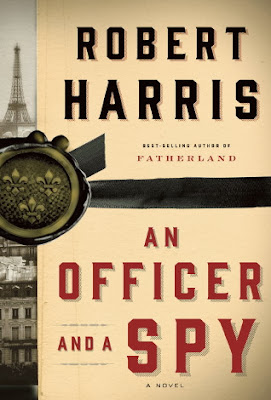(from kirkusreviews.com
by Gerald Bartell)
Robert Harris photographed by Michael Lionstar.
An Officer and a Spy is one of Robert Harris’ most expansive thrillers. Spanning over a decade, the novel follows what happens after the unjust conviction of Captain Alfred Dreyfus in Paris in 1895. This surging tale of spies, investigations and witch-hunts begins with a list of Dramatis Personae that takes up three pages; the book itself runs over 400 pages.
Yet a year ago, the prolific Harris had not a single word on paper.
The author of Enigma, Fatherland, Pompeii, et al., had signed on to the project at the behest of film director Roman Polanski. The two men had co-written the screenplay for the successful adaptation of Harris’ The Ghost (re-titled The Ghost Writer for film), which Polanski then directed. Now the film director wanted to work with Harris on a film about Dreyfus.
Polanski had long been drawn to the story of Dreyfus, an Alsatian Jew wrongly convicted and imprisoned for five years on Devil’s Island for passing secrets to the German military in 1894. Polanski, who was imprisoned in 1977 on charges of unlawful intercourse with a minor, recently acknowledged that he empathized with Dreyfus. “The media, like the army [in Dreyfus’] time or like any state institution,” he recently told RTL radio in Europe, “never want to admit to a mistake.”
Continue reading >
But over the years, the Dreyfus case has been the subject of scores of books and films, and the idea of another film about it failed to excite Harris.
“I looked at the story with a slightly heavy heart,” Harris said recently from Switzerland, where he is working with Polanski on the film adaptation of the novel. “[The Dreyfus Affair] is a sort of vast case that goes on for 12 years and involves a cast of hundreds.”
But Polanski’s enthusiasm for the project was contagious, Harris says, so the author read some accounts of the trial and the years that followed. That was when he came across the story of Major Georges Picquart.
Picquart had begun a career in the French army in the 1870s. After serving in the infantry, he became a lecturer at the French Military Academy. When Dreyfus came to trial, Picquart reported on the proceedings to the Ministry of War. After the conviction, Picquart moved to army intelligence. There he soon uncovered evidence that suggested a spy still was passing secrets to Germany and that Dreyfus might have been entirely innocent of the charges brought against him. Like the protagonists in Harris’ other thrillers, Picquart set out to uncover a mole.
“There would have been no Dreyfus Affair without Picquart,” Harris says. “His story is untold; he’s not a person anyone has heard of much today. He was what I could bring to the party.”
And so, Harris set about looking for clues to Picquart’s part in the Dreyfus Affair. Harris had a windfall last March when the French Ministry of Defense harris_coverreleased hundreds of documents related to the case – witness statements, letters, notes on the investigation – that were archived in 1906 but never made available to the public.
To Harris, Picquart emerged from the myriad details as a hero. “He could not swallow his principles to have an easy career,” Harris says. “He was incredibly brave and really quite serene throughout what happened. His sense of honor is the strongest aspect of him.”
Now Harris wanted to write the story, first as a novel, then as a screenplay. With another film project beckoning, Polanski agreed. A trove of research at hand, Harris sped through work on the book.
“Sometimes there’s no justice in writing any more than there is in anything else,” he says. “You can labor for years on a subject and get nowhere. On other occasions, things seem to work out.”
Indeed, so far “things” have worked out very well for the book. When it was published last fall in Great Britain, reviewers raved. The London Times hailed it as “a bravura display of all [Harris’] fictional skills” and “a cracking read from start to finish.” The Scotsman termed it “a classic.”
As the papers published their reviews, they were also covering the Edward Snowden affair. Harris, who had never heard of Snowden until then, was struck by the case’s similarities to the Dreyfus Affair and to the plots and characters in Harris’ other novels, which take place in the treacherous world of spying and intelligence gathering.
“The modern world begins with the Dreyfus case and its cover-ups, secret trials, putting people on islands and keeping them away from lawyers—it’s intelligence getting out of control,” Harris says. “We don’t learn from the past. We simply go on repeating the same patterns of behavior. Cicero would be a recognizable figure in contemporary America.”
Gerald Bartell’s book coverage also appears in the Washington Post, the Kansas City Star and the San Francisco Chronicle.


No comments:
Post a Comment